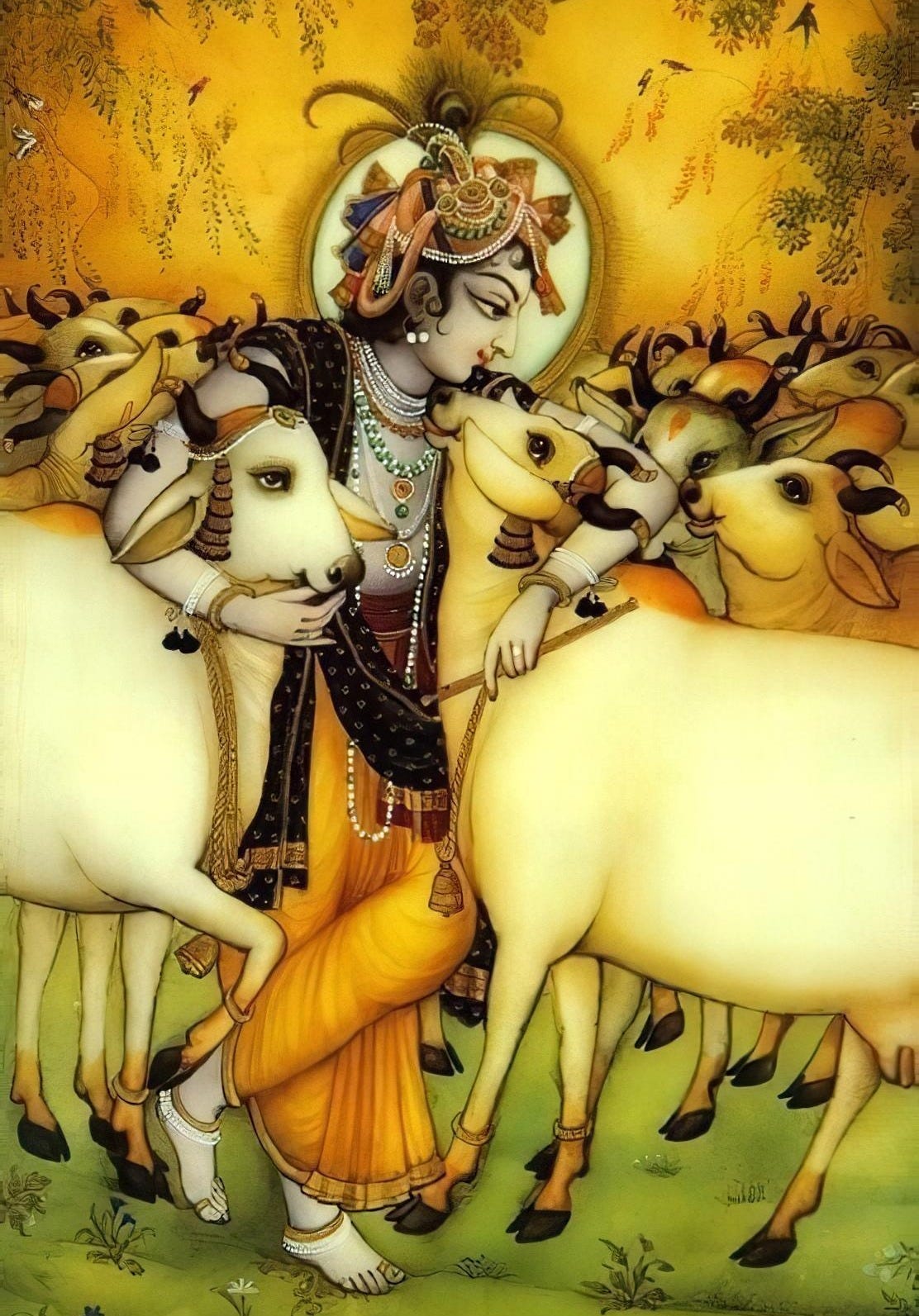The Vaiṣnava schools
The work of Śaṅkarācārya was not in vain. He fulfilled his mission of reducing the influence of Buddhism in India and brought back the study of the Vedas, opening the door to the Vaiṣnava ācāryas.
« Vedānta-sūtra: The Govinda-bhāṣya of Baladeva Vidyābhūṣaṇa
The Vaiṣnava schools
Śankarācārya spoke the truth, but not the whole truth. He hinted at the true conclusion of the Vedas being the process of devotional service, but most of his followers were not able to catch it. Instead, they emphasized the impersonal aspects of the philosophy and ended up becoming full-blown Māyāvādis.
However, the work of Śankarācārya was not in vain. He fulfilled his mission of reducing the influence of Buddhism in India and brought back the study of the Vedas and the acceptance of brāhminical culture. Although not able to understand the real meaning of the scriptures, people again accepted the knowledge of the scriptures as infallible knowledge, and this opened the path for the advent of the four great Vaiṣnava ācāryas, culminating with Sri Caitanya Mahāprabhu. Each of the four ācāryas was able to establish a new component of the devotional philosophy, creating the conditions for the appearance of Sri Caitanya Mahāprabhu, who brought the conclusion. Each of the four ācāryas had full knowledge of the conclusion of the scriptures, but they were teaching according to time, place, and circumstance, fulfilling their missions. When we study the philosophies of the four great ācāryas, we can find differences between them, but we should not see them as contradictions, but just as different points of view of the same supreme absolute truth. They all agreed on the fundamental conclusions.
In the Śrī Navadvīpa-dhāma Māhātmya (chapter 16), it is described a visit of Nimbārkacarya to Navadvīpa, where he met with the four Kumaras. They told him:
“Knowing that Kali-yuga would be dark, the merciful Lord decided to preach devotion. He empowered four devotees and sent them to preach devotion throughout the world. Rāmānuja, Madhvācārya, and Viṣṇu Swāmī are three of them. You are the fourth of these great devotees. Lakṣmī Devī accepted Rāmānuja, Brahmā accepted Madhvācārya, and Śiva accepted Viṣṇu Svāmī. Today, we have met you personally. We will make you our disciple and thus become fortunate. This is our purpose.”
After giving him initiation, the Kumaras instructed Nimbārkacarya on the teachings of the Sanat-kumāra-samhitā and in the worship of Radha and Kṛṣṇa. By faithfully worshipping the Lord, He finally had the darśan of the divine couple, who revealed to him their combined form as Sri Caitanya Mahāprabhu, who told him:
“O great soul, for now, keep this form a secret. Preach devotion to Kṛṣṇa and the pastimes of the Divine Couple. Their pastimes are my greatest joy. When I appear in the form of Gaura, I will find great pleasure in pastimes of scholarship. At that time, you will take birth in Kāśmīr and travel throughout the land of Bhārata, conquering all directions. Everyone, everywhere, will call you Keśava Kāśmīrī and praise you for being highly learned. While travelling, you will come to Navadvīpa Dhāma and stay in the village of Māyāpura. Hearing your name, the greatest scholars in Navadvīpa will flee. At that time, immersed in pastimes of scholarship, I will defeat you and feel great pleasure. By the grace of Sarasvatī, you will understand My identity, take shelter of Me, and give up your pride. Then, I will give you devotion and send you to preach devotion again. So for now, satisfy Me by preaching the conception of dualistic non-dualism and keep My identity secret. When I start My sankīrtana pastimes, I will preach the essence of your conception.”
Sri Caitanya Mahāprabhu then revealed:
“When I start My sankīrtana pastimes, I will preach the essence of your conception. I will accept two essential principles from Madhva Ācārya. One is his refutation of exclusive non-dualism. O great soul, know the second essential principle to be serving Kṛṣṇa’s Deity form, knowing the Deity to be eternal.
From Rāmānuja, I will take two essential principles: exclusive devotion and service to the devotees. From Viṣṇu Svāmī, I will accept two essential principles: surrender to the Lord and the path of love. From you, I will accept two most essential principles: taking shelter of Rādhārāṇī exclusively and serving in the mood of the gopīs.”
You can also donate using Buy Me a Coffee, PayPal, Wise, Revolut, or bank transfers. There is a separate page with all the links. This helps me enormously to have time to write instead of doing other things to make a living. Thanks!
« Vedānta-sūtra: The Govinda-bhāṣya of Baladeva Vidyābhūṣaṇa


